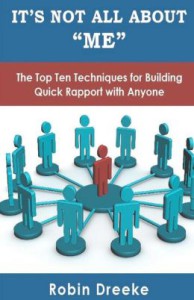Book Recommendation: It’s Not All about “Me”
 One of the key themes of this blog is outside-in thinking, so it’s no surprise that a book entitled, It’s Not All About Me: The Top Ten Techniques for Building Quick Rapport with Anyone
One of the key themes of this blog is outside-in thinking, so it’s no surprise that a book entitled, It’s Not All About Me: The Top Ten Techniques for Building Quick Rapport with Anyone, caught my attention.
As an FBI agent, Robin Dreeke used these techniques to gain quick rapport in order to get people to open up to him, sometimes revealing far more than they expected to. I doubt many of my readers are trying to cultivate undercover informants, but it’s a useful skill to have in sales and just about any persuasive communication.
Many of the techniques will be familiar to the average reader of this blog, and many are common sense, albeit of the kind which we need to constantly reinforce and practice to turn them into productive habits. Examples are #5, suspending your ego so you don’t always have to win or be right, and #6, validating others to make them feel important, particularly by improving your listening attitude and skills.
But there are also many useful tips which were new to me (and I’ve read a lot on the topic, ranging from beginning with Dale Carnegie, through Daniel Goleman and most recently to Neffinger and Kohut), especially since the book is filled with anecdotes illustrating the use of each technique in real life. One example is technique #1, establishing artificial time constraints. When you approach a stranger to strike up a conversation, they generally feel uncomfortable because they don’t know how much of their time you’re going to take up. You can sometimes get people to put down their guard if you show or tell them up front that you’re only going to take up a quick bit of time.
It’s possible that some of these things could be seen as “manipulative”, but that depends on your intent. If you genuinely take an interest in the other person and have their best interests in mind, using the techniques will leave them feeling better for having talked to you, and that is a win for all concerned.
To put this book into the larger context of the sales world, the publication of The Challenger Sale ignited a debate about the relative effectiveness of challenger selling vs. relationship selling. While I personally give a slight edge to challenger selling, I don’t see any reason at all that they should be mutually exclusive. Relationships may not be all-important in B2B sales[1], but they certainly are important, and you don’t have to be disliked to deliver challenging insights about the customer’s business. Besides, if they like you, they are more likely to listen in the first place.
[1] As the old saying goes in sales: “If you want a friend, get a dog.” I have two, so what does that say about me?




Interesting book suggestion. Will look it up to read. Thanks.
Jack,
What that says about you is that you have at least 3 friends, if you include me.
Andy